|
|
|
Sort Order |
|
|
|
Items / Page
|
|
|
|
|
|
|
| Srl | Item |
| 1 |
ID:
028684
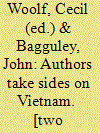

|
|
|
|
|
| Publication |
London, Peter owen., 1967.
|
| Description |
ix, 232p.hbk
|
|
|
|
|
|
|
|
|
|
|
|
Copies: C:1/I:0,R:0,Q:0
Circulation
| Accession# | Call# | Current Location | Status | Policy | Location |
| 000172 | 959.7043/WOO 000172 | Main | On Shelf | General | |
|
|
|
|
| 2 |
ID:
134060
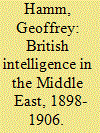

|
|
|
|
|
| Publication |
2014.
|
| Summary/Abstract |
This article examines British intelligence efforts in Turkish Arabia at the turn of the twentieth century. It argues that intelligence collection was really three separate efforts, carried out by the War Office, the Foreign Office, and the Government of India, and it reflected concerns about British decline, the problems experienced during the Boer War, as well as an effort to penetrate the 'information order' of India's sub-empire. Although intelligence efforts suffered from bureaucratic disharmony in Whitehall, and between London and the Government of India, valuable contributions were nevertheless made to Britain's knowledge of Turkish Arabia.
|
|
|
|
|
|
|
|
|
|
|
|
|
|
|
|
| 3 |
ID:
133407
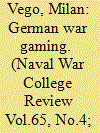

|
|
|
|
|
| Publication |
2012.
|
| Summary/Abstract |
The article discusses the German military's historical use of war gaming, with particular focus given to the early-20th century and World War II. The author begins with a brief general history of war games, beginning with those ancient Gupta Empire in India. The war games implemented by German Field Marshal Alfred von Schlieffen at the turn of the 20th century in anticipation of an invasion of France are described, with emphasis given to their focus on informing subordinate officers of Schlieffen's plans. The educational nature of interwar German war games, especially those of the Reichsmarine (German Navy) is explained. The differences between tactical and strategic games are also explored.
|
|
|
|
|
|
|
|
|
|
|
|
|
|
|
|
| 4 |
ID:
131420
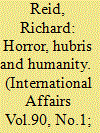

|
|
|
|
|
| Publication |
2014.
|
| Summary/Abstract |
This article examines the international engagement with Africa from the First World War and the apex of colonial rule through to the present day. It is argued that there have been dramatic shifts throughout this period-from increasing interventionism on the part of the colonial state, to decolonization and the emergence of nation-states with independent foreign policy programmes, to the predations and influences of the Cold War, to the developmentalism and humanitarianism of the contemporary era. Yet, there has also been marked continuity in terms of policy, perception and practice. In particular, Africa has long been seen in terms of economic opportunity-a place where markets and raw materials abound-and of military and political threat, a place in which intrinsic instability makes external intervention both desirable and inevitable. While immediate contexts have changed over time, the international engagement with the continent remains essentially economic and military. A concern for democratization and development represents a relatively new element, although even this can be traced to the paternalistic humanitarianism of the colonial era and, earlier still, moral stances toward Africa in the nineteenth century.
|
|
|
|
|
|
|
|
|
|
|
|
|
|
|
|
| 5 |
ID:
131515
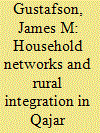

|
|
|
|
|
| Publication |
2014.
|
| Summary/Abstract |
The governorships of Muhammad Isma?il Khan Vakil al-Mulk (1859-68) and Murtaza Quli Khan Vakil al-Mulk II (1868-78) in Qajar Kirman were highlighted by an extensive building campaign which initiated a period of significant social and economic change in the province. This article explores the activities of local elites in managing their family estates in the context of this project through a careful analysis of provincial geographical and historical writings, Persian-language travelogues, and commentary by European administrators and travelers. Kirmani elites began investing in land and commercial agriculture on an unprecedented scale, accelerating Kirman's absorption into global economic patterns as a producer of raw materials like cotton, wool, and opium. An integrated political economy developed regionally through the expanding networks of elite households and their estates, reinforced by families combining landownership with administrative functions in rural areas. This process demonstrates the extent to which Iranians were active participants in transforming their communities in the context of the advance of global capitalism, with longstanding patterns of elite household competition playing an important role in mediating social and political change locally.
|
|
|
|
|
|
|
|
|
|
|
|
|
|
|
|
| 6 |
ID:
132796


|
|
|
|
|
| Publication |
2014.
|
| Summary/Abstract |
Following the successful conclusion of the "India and the Great War' international conference held at the USI from 05-07 Mar 14 (see report in the USI Journal of Jan-Mar 2104 pp. 112-126) considerable interest was generated both nationally and internationally in the project. This was reflected in the spike in number of "hits" on the project's internet based platforms including the Facebook and Flickr pages. The Inaugural and Valedictory speeches of both, the Hon'ble Vice President and the Foreign Secretary, respectively, were featured on their own websites and served to generate greater awareness about the project as well as
to act as a stimulus for greater official involvement in the numerous activities planned to highlight India's role in the war on an international platform.
|
|
|
|
|
|
|
|
|
|
|
|
|
|
|
|
| 7 |
ID:
131762


|
|
|
|
|
| Publication |
2014.
|
| Summary/Abstract |
This article revisits the security dilemma theory and its application to civil conflict. Based on a careful reading of existing studies, it exposes the deviations from the original theory developed in the 1950s and more recent amendments, which have substantially reduced the explanatory value of the theory. The article shows that when the original and the amended versions of the theory are applied to civil conflict, neither can explain the outbreak of armed conflict. While anarchy might be present as a precondition for the dilemma to operate, a previous history of violent interaction often leaves little room for misperception of intentions. Absent uncertainty about malign intentions toward the other group, the security dilemma theory loses relevance to explain the outbreak of civil conflict.
|
|
|
|
|
|
|
|
|
|
|
|
|
|
|
|
| 8 |
ID:
131399
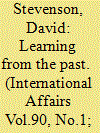

|
|
|
|
|
| Publication |
2014.
|
| Summary/Abstract |
This article is based on an inaugural lecture for the Stevenson Chair in International History, given at the London School of Economics (LSE) in October 2012. It re-examines the origins in Britain in the 1920s of the academic discipline of international history, focusing on the partnership between the LSE and Chatham House. It highlights the differences among the discipline's founders between broader and more tightly defined conceptions of its subject matter and scope, identified respectively with Arnold J. Toynbee on the one hand and with Harold Temperley and Charles Webster on the other. It also underlines the founders' agreement about international history's practical applicability, particularly for analysing and even for helping to prevent the outbreak of major wars. It explores the theme of 'learning from the past' by investigating the interconnection between the diplomatic crises of July-August 1914 and October 1962, reappraising John F. Kennedy's use of history to inform statesmanship. The article points to a recurrent pattern in the international conjunctures of 1914, 1939 and 1962 that may be replicating itself again today. It concludes that a knowledge and understanding of international history can indeed yield insights of practical value, though must be drawn on flexibly and with imagination.
|
|
|
|
|
|
|
|
|
|
|
|
|
|
|
|
| 9 |
ID:
131761
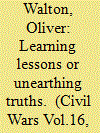

|
|
|
|
|
| Publication |
2014.
|
| Summary/Abstract |
This article assesses the potential for evidence-informed policymaking in the field of mediation. It argues that one of the key barriers to evidence-informed policymaking in this area is the disjointed character of the existing literature and finds that methodological and theoretical tensions lie at the heart of policy debates around mediation. While differences in theoretical, epistemological and normative perspectives of the existing research have made it difficult for policymakers to draw clear conclusions from the available evidence, the article nevertheless identifies a degree of convergence around certain key themes such as the importance of legitimacy in determining conflict outcomes and the benefits of combining quantitative and qualitative methods. It concludes by highlighting the importance of policy experimentation, evaluation and building capacity for policy learning in mediation policymaking.
|
|
|
|
|
|
|
|
|
|
|
|
|
|
|
|
| 10 |
ID:
134086
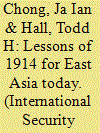

|
|
|
|
|
| Publication |
2014.
|
| Summary/Abstract |
The importance of World War I for understanding contemporary East Asia lies not in the ubiquitous analogy drawn between Anglo-German antagonism and contemporary U.S.-China relations, but rather in the more specific lessons the period preceding its outbreak offers concerning the sources of instability and conflict among states. More precisely, these lessons relate to the challenges posed by complex security arrangements, the dual-edged nature of nationalism, and the dangerous dynamics that can emerge during repeated crises. Appreciating how these factors contributed to mounting tensions and eventually the onset of war in Europe a century ago can enhance efforts to understand and manage tensions in East Asia today.
|
|
|
|
|
|
|
|
|
|
|
|
|
|
|
|
| 11 |
ID:
131458
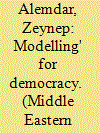

|
|
|
|
|
| Publication |
2014.
|
| Summary/Abstract |
Although Turkey has come a long way in terms of human rights since the 1980 military coup, a closer historical look inside the Turkish political scene shows us how freedom of speech was always to be sacrificed if its exercise threatened the perceived unity of the country. The article shows how decision makers' perceptions of the state as a superior institution in need of protection have shaped the practice of governing free speech in Turkey since the early years of the Republic, and introduces a unique chronology, accounting for the interaction of internal and external influences.
|
|
|
|
|
|
|
|
|
|
|
|
|
|
|
|
| 12 |
ID:
132488
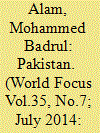

|
|
|
|
|
| Publication |
2014.
|
| Summary/Abstract |
Like in any nuclear weapon state, multiple vulnerabilities exist in a nuclear weapons complex. In the case of Pakistan, it is possible that groups or individuals may violate security rules for a variety of reasons, including pro?t making, settling a vendetta, or religious or ideological motives. Rogue elements may try to gain control over sensitive items for their own use or to transfer these items to another state or to other non-state actors for ?nancial or ideological reasons. A special concern is that of Pakistan, as its history_ suggests, may suffer another military coup at some point of time. A new leadership, in that case, can be expected to- place a high priority on seizing the country's nuclear assets
|
|
|
|
|
|
|
|
|
|
|
|
|
|
|
|
| 13 |
ID:
133394
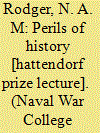

|
|
|
|
|
| Publication |
2013.
|
| Summary/Abstract |
The British naval historian N.A.M. Rodger, in the Hattendorf Prize Lecture last October at the Naval War College, emphasized both the importance of studying history and the perils of misusing the past to analyze current international relations. Historians who use the past to predict the future, he said, are foolish.
"History," he explained, "never repeats itself exactly; historical parallels are never really parallel, and the 'lessons of history' are at best general warnings, not specific instructions.
|
|
|
|
|
|
|
|
|
|
|
|
|
|
|
|
| 14 |
ID:
132028
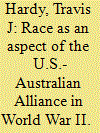

|
|
|
|
|
| Publication |
2014.
|
| Summary/Abstract |
World War II marked a watershed for American diplomatic practice as the nation moved away from its traditional ideas of unilateralism toward a foreign policy based on the construction of foreign alliances and relationships. Many of those relationships continue to be a central part of American diplomacy and one of the strongest is the American relationship with Australia. Historical study of the American-Australian alliance traditionally focused on how the alliance came into being because of the economic relationship between the two powers or because of the exigencies of World War II in the Pacific. What emerged from these studies was an overly simplistic understanding of what was dynamic and complex relationship between two states who often found themselves at cross-purposes. This essay points to the presence of a shared sense of racial identity among the general populaces and how this was utilized by policymakers to ameliorate the contentious nature of the alliance during the war. The creation of the American-Australian relationship was often as much driven by ideas of how the world was ordered as it was by the reality of events facing the two states during the war.
|
|
|
|
|
|
|
|
|
|
|
|
|
|
|
|
| 15 |
ID:
131773
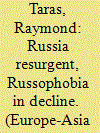

|
|
|
|
|
| Publication |
2014.
|
| Summary/Abstract |
Russia
Poland
Russia - Poland
Polish Russophobia
Western Christianity
Historical Aspects
Europe
History - Europe
International Relations - IR
European Union - EU
Collective Security
Foreign Policy
Polish Leadership
Politics
Cooperative Foreign Relations - CFR
Polish Domestic Politics
|
|
|
|
|
|
|
|
|
|
|
|
|
|
|
|
| 16 |
ID:
132103
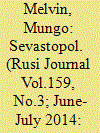

|
|
|
|
|
| Publication |
2014.
|
| Summary/Abstract |
Many saw Russia's annexation of Crimea in March 2014 as a throwback not only to the Cold War, but to earlier memories of Russian imperialist aggression. In such a heated climate, it is essential to understand not only the strategic calculations of contemporary Russia but also its historical, cultural and emotional links to a region that has, for centuries, been at the heart of Russian national identity. Mungo Melvin brings to life this longstanding relationship in a historical, literary and military journey through the birth and struggles of Sevastopol, Crimea's iconic citadel on the Black Sea shores.
|
|
|
|
|
|
|
|
|
|
|
|
|
|
|
|
|
|
|
|
|